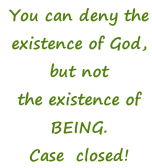



 NEXT
NEXT
 BACK
BACK
 Forum
Forum


Philosophical musings on Quanta & Qualia; Materialism & Spiritualism; Science & Religion; Pragmatism & Idealism, etc.




Post 93. July 30, 2019
The Case for G*D
Logos, Ousia, World Soul
Just as she is ambiguous about the nature of God, Armstrong is somewhat indirect and mysterious about the Christ Myth. “You can never know the essence of the divine. But God has adapted this ineffable transcendence to our limited understanding and has come to meet us.” I suspect that she still considers herself to be a Christian, but primarily due to her cultural background, rather than to faith in the myth and doctrine of her Catholic upbringing. Perhaps Jesus is merely a teacher and role model like the Buddha, instead of a savior and redeemer. When asked about heaven, she replied, “I'm not interested in the afterlife.” Presumably, as a Jew, Jesus didn’t have a tradition of expecting a life-
However, she is broadly catholic5, in the sense of being open to learning about divinity from a variety of traditions and cultures. She thinks the religious instinct is universal; yet, “We can't reproduce the spiritualities of the past because we are 21st-
At the end of the interview, Karen Armstrong was asked, “what verb do you think best captures your relationship to God?” And she replied, “Seek. I seek and will seek forever without possibility of finding the clinching moment.” Unfortun-
End of Post 93
“Ousia”
“I AM”
“Logos”
“Tao”
“”Brahman”
“BEING”

3. Afterlife :
An essential motivating belief of Christianity, that was not commonly held by Jews, such as Jesus. Perhaps inherited by Christians from the minority sect of Essenes.
“Judaism is famously ambiguous about what happens when we die.”
https://www.myjewishlearning.com/article/life-
4. Spiritualized :
Focused on the idealized afterlife, instead of the real now-
5. Catholic :
Universal; general; liberal; inclusive; embracing a wide variety of beliefs.
6. Existentialist :
In the cryptic words of Sartre, “existence precedes essence” BEING is more fundamental than beings.
According to Kierkegaard, “each individual—not society or religion—is solely respons-
Armstrong seems to accept the apparent absurdity of a world without a revelation from God, but she Stoically pursues her own authenticity.

How not to talk about God:
1. As if the deity is a fact to be proven empirically.
2. In absolute terms of Either/Or.
3. As if you know God personally.
4. In terms of a single tradition’s dogma.
5. As a tyrannical king on a throne.
6. As if the universal BEING has a favorite race of people.
